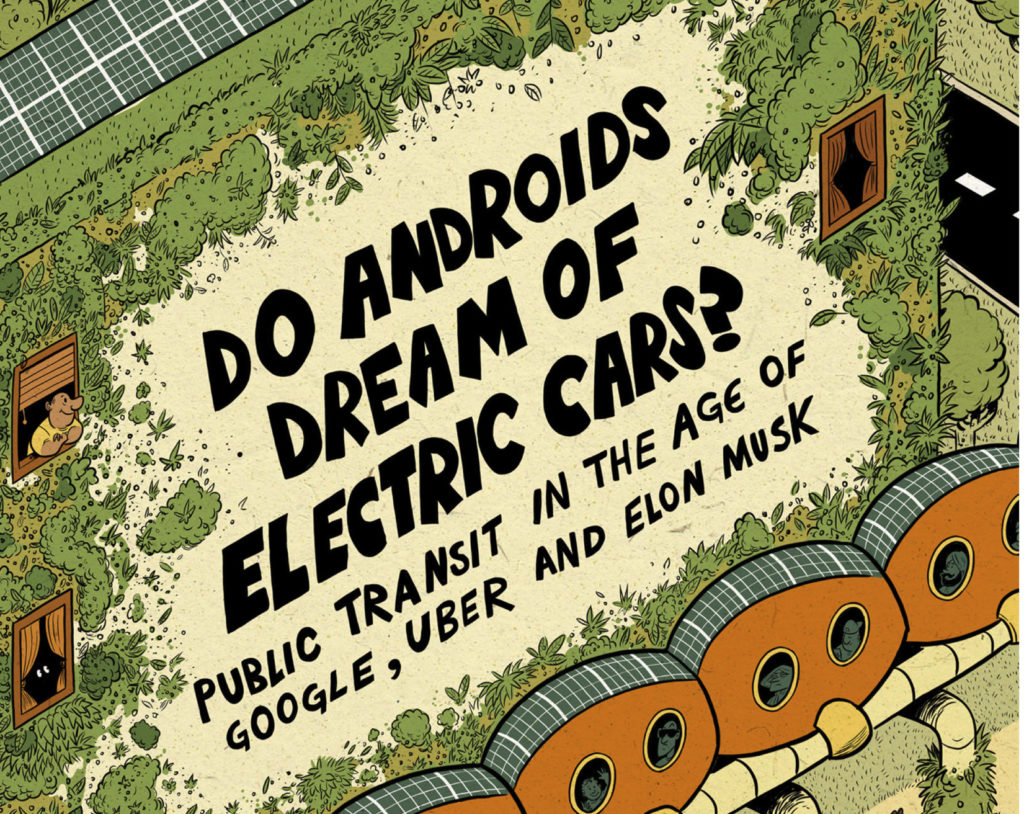by Adya Afanou, April 9, 2020
Do Androids Dream of Electric Cars Public Transit in the Age of Google, Uber and Elon Musk?, James Wilt, Between the Lines, April 22, 2020, 300 pp., $27.67
Why is it taking so long?
On the road, stuck in traffic.
On the side of the road, freezing at a bus stop surrounded by our grocery bags.
Underneath the road, packed like sardines on a sordidly lit platform, peering into the tunnel for signs of the next train.
On and off the road, swaying in-between cars and pedestrians because there are no bike lanes.
We’ve all asked ourselves this question before, haven’t we?
In Do Androids Dream of Cars? Public Transit in the Age of Google, Uber and Elon Musk, journalist James Wilt offers an answer.
“A war for streets and communities is currently underway” he writes. “It’s the same war that created automotive dominance and sprawled, racially segregated regions in the first place.”
In this war, public transit is losing, and, in turn, we all are. The author argues that the advent of electric and self-driving cars, and the success of companies like Uber and Tesla are fueling public policies and already have a funding bias towards privatized transportation. But the issue goes beyond the ‘bus and train versus car’ or ‘privileged versus underprivileged’ rhetoric.
In his book, Wilt presents a history of public transit in the US, with some examples from Canada.
The various mechanisms that have led to entire public networks to fall into disuse over time, ridership to decline, delays, complaints and public mistrust to rise. It touches to vast social fields like housing, education and employment, health, and of course globalization and the environment are covered.
Wilt advocates for more “free, reliable, accessible, and pleasurable public transportation” and reveals what modern public transit, if adequately backed by political powers, would look like when faced with the Teslas and Ubers of this world. Benefiting benefit the entire population, it would not be only for pedestrians and cyclists, and the communities with direct access to them, it is what public service should do.
Very little stands in the way of the future Wilt paints.
Knowledge and technology exist. The author rounds up research and opinions from numerous experts with visions of what could be done, how and for how much, and how the costs would be a fraction of the investments and subsidies the automobile industry has received in decades for new infrastructure, research and development, international commercialisation agreements and so on.
The key to ignite that change is elected officials who amply understand the daily grind, who pledge public transit their unwavering support, term after term after term, for every budget, in every speech, on all the political arenas, and around the corridors of power.
You might have to take your car out for every errand. You may be one of those urban warriors who runs or bikes to and from work every day (much respect by the way!).
Or you might be like me, a savvy pedestrian who has learned to juggle a mix of bus-train-walk-taxi/Uber for work and pleasure, but who wishes there was a simpler way, cheaper and environmentally-friendly way, this books gives a roadmap to uphold the best interest of our society and end the war.
Now, if only our elected officials would read it…
(With 15 years of experience, Adya Afanou is who has worked with a range of nonprofits in Quebec, Ontario and West Africa.)
